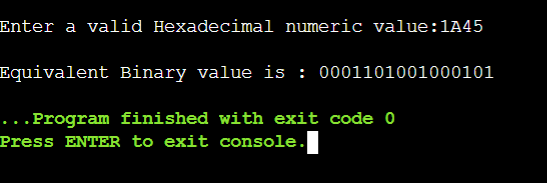How to convert Hexadecimal to Binary in C++
A hexadecimal number has Base 16. A Binary has base 2. A binary number can contain 0s and 1s. Hexadecimal consists of the digits 0-9, A-F.(A-F represents 10-15)
Conversion of Hexadecimal to Binary
Each Hexadecimal digit has a corresponding binary value. Converting hexadecimal to binary is as simple as writing each hexadecimal digit binary correspondent.
To write the binary correspondent we follow the 8421 rule. (8421 rule)
So as per this rule, the hexadecimal digits are converted to binary as follows:


PROGRAM:
#include <bits/stdc++.h>
using namespace std;
void HexToBin(string hexdec)
{
long int i = 0;
while(hexdec[i]!='\0')
{
switch (hexdec[i])
{
case '0':
cout << "0000";
break;
case '1':
cout << "0001";
break;
case '2':
cout << "0010";
break;
case '3':
cout << "0011";
break;
case '4':
cout << "0100";
break;
case '5':
cout << "0101";
break;
case '6':
cout << "0110";
break;
case '7':
cout << "0111";
break;
case '8':
cout << "1000";
break;
case '9':
cout << "1001";
break;
case 'A':
case 'a':
cout << "1010";
break;
case 'B':
case 'b':
cout << "1011";
break;
case 'C':
case 'c':
cout << "1100";
break;
case 'D':
case 'd':
cout << "1101";
break;
case 'E':
case 'e':
cout << "1110";
break;
case 'F':
case 'f':
cout << "1111";
break;
default:
cout << "\nInvalid hexadecimal digit "<< hexdec[i];
exit(0);
}//switch
i++;
}//while
}//hexa
int main()
{
char hexdec[100] ;
cout<<"\nEnter a valid Hexadecimal numeric value:";
cin>>hexdec;
cout << "\nEquivalent Binary value is : ";
HexToBin(hexdec);
return 0;
}//main
OUTPUT

Submitted by Sangeetha Prabhu (BuzzingBee)
Download packets of source code on Coders Packet
Comments